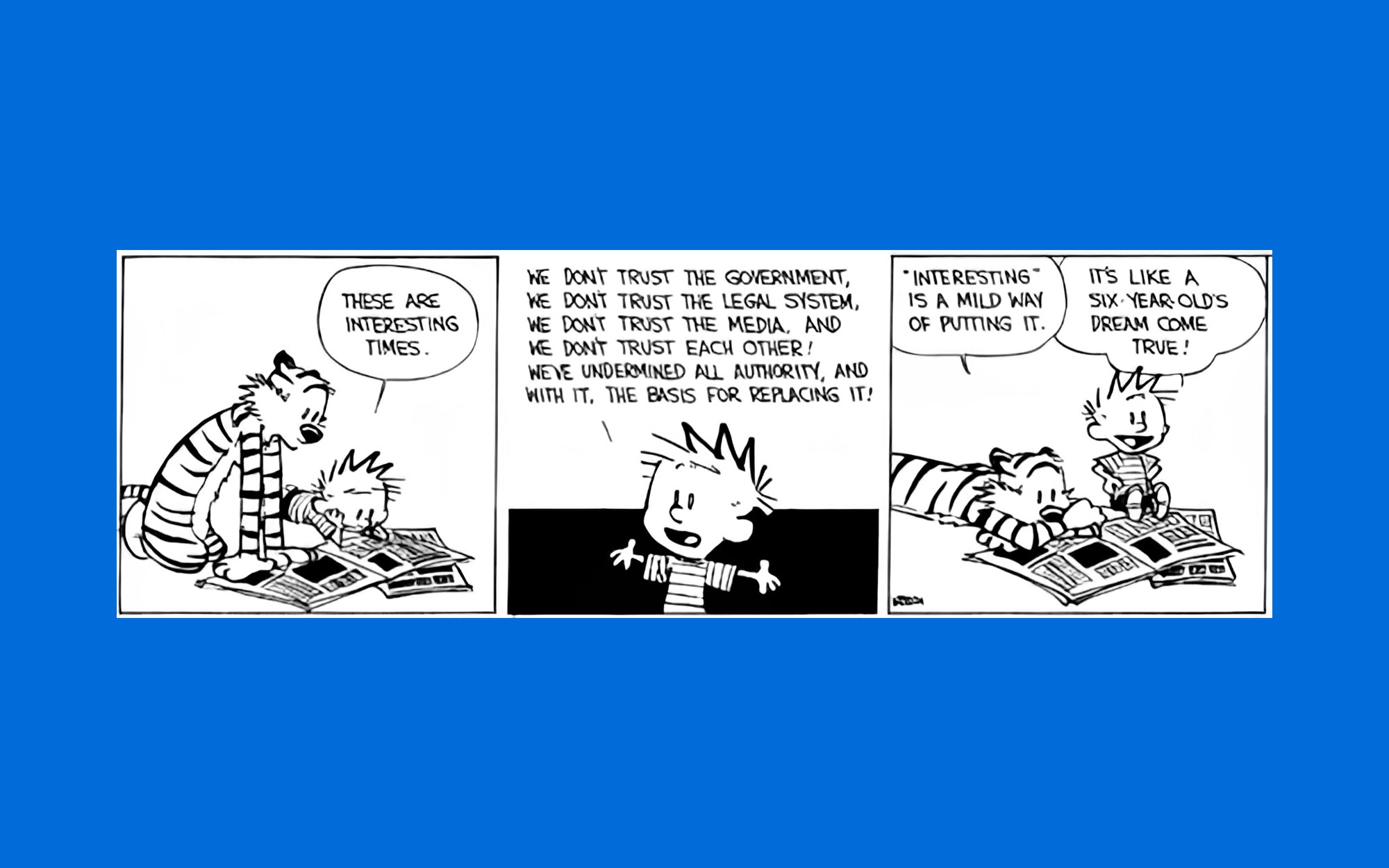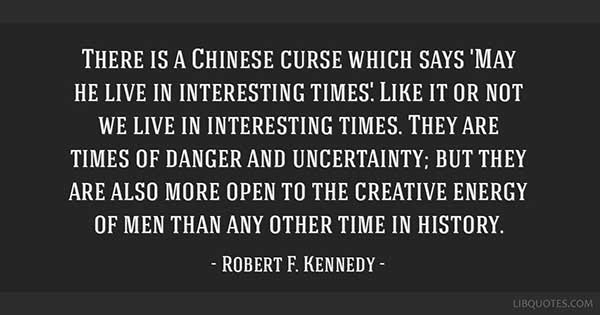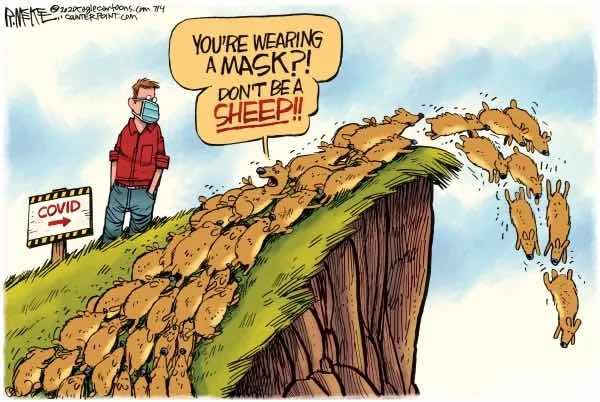[Press PLAY and you can listen to a reading of this article.]
[ Press PLAY and you can listen to a reading of this article ]
[ I recommend to use Google Chrome browser if you experience problems using the audio.
I still need to optimize the audio player for some of the other browsers. ]
May you live in interesting times!
Oh Boy!
(And Girl! 😉 )
Aren’t we living in truly interesting times!
“May you live in interesting times” is an English expression that is commonly thought to be a translation of a traditional Chinese curse. But, according to the all-knowing Wikipedia, there is actually no known equivalent expression in Chinese.
The closest related Chinese expression translates as:
“Better to be a dog in times of tranquility than a human in times of chaos.”
Sounds pretty dark-ish,
yet rather fitting,
for this Summer of 2024.
“May you live in interesting times!” is usually meant to be ironic.
Such “interesting” times are often times of trouble & upheaval.
Personally, I actually see the Light in it, in The Upheaval. I see the potential in such times, the possibility of fundamental change.
Personally, I don’t mean it as a curse, rather as a promise!
But more about that later ….
Robert F. Kennedy, United States attorney general 1961 to 1964,
the brother of John F. Kennedy.
From a speech given in Cape Town, 6 June 1966.
Robert F. Kennedy, he was one of the good guys, to all of my knowledge. Two years later he was dead, assassinated, shot at point-blank range.
Two days ago Donald Trump was almost shot dead.
Almost. Just two centimeters to the left and history would probably look very different then it will now.
This is awful, this is terrible, as bad as it gets.
This is very bad, a sign of things to come.
I make no attempt to hide my disgust about this person, Donald “Teflon” Trump. I always felt that he is thru and thru rotten as a character and yet surprisingly and incredibly powerful.
When I feel into him, I feel Luzifer, the Dark Prince having found a perfect vehicle to wreck havoc in this world.
~~~
I have a very bad feeling, honestly the “State of the World” is having an effect on my liver. Liver, our metabolic organ, detoxing, she helps us digesting things.
Metaphorically speaking, she is stressed right now. There is a lot to digest, a lot of shit going on in our world.
I have been a a-political person all my life, this means I don’t subscribe to any specific political ideology or party. Never have. Left or right? Capitalist or Communist? Red or Blue or whatever. Never been my cup of tea.
Not that I am ignorant or disinterested with what’s going on in the world, in the countries, locally or geo-politically! On the contrary, I read NYT, Guardian, Die Presse, Al Jazeera every day. Reuters.com as well.
I consider myself pretty well informed. And it’s not only intellectually. I feel all of it. I have empathy, I feel sad, I feel disgust, I feel rage.
This is why I am really worried right now, this is why I even start to write on this blog again.
I feel the earth is moving under our feet, the tectonic plates are shifting in significant ways.
I feel the political vectors, the direction of worldwide trends are pointing to ….
Well, I think that in case we – humanity – collectively does not turn around radically, it looks like doom. And I am definitely not alone with such a perspective. Call it personal opinion, call it pre-cognition, call it prophesy.
I rather see it as a clear eyed recognition of the facts.
- – We are now 8.1 billion humans on Planet Earth. And growing, some of us reproducing like there is no tomorrow.
- – Approximately 56% of of us choose to live in cities.
- – There are 34 megacities with more than 10 million inhabitants.
- – Wealth inequality: a very small elite, the top 1% of the world’s population owns 45% of all global wealth.
- – Approximately 9% of the global population, or about 700 million people, live on less than $1.90 a day.
- – Child mortality rate: ~37 per 1,000 live births.
- – 750 million people experience chronic hunger and acute food insecurity.
- – Food waste: ~1.3 billion tons annually, this is 1/3 of all food produced.
- – People without access to safe drinking water: ~785 million.
- – Population living in water-stressed countries: ~2.3 billion.
- – Obesity rate: ~13% of adult population globally.
- – Nearly 800 million people, experience chronic hunger and food insecurity.
- – Mental health disorders, including depression and anxiety: 15% of the global population.
- – People with depression globally: ~280 million.
- – Annual economic cost of mental disorders: ~$1 trillion USD.
- – Children with no access to schools: ~258 million globally.
- – Global average temperature: 1.2°C above pre-industrial levels.
- – Sea level rise: 3.4 mm per year, threatening coastal communities worldwide.
- – Arctic sea ice and glaciers melting rapidly.
- – Deforestation rate: ~10 million hectares per year.
- – Plastic waste in oceans: ~150 million metric tons
- – People displaced by weather-related events annually: ~20 million.
- – Species threatened with extinction: 28% of all known species.
- – Internet users: ~5.3 billion.
- – Smartphone users: ~6.8 billion.
- – Over 4.5 billion people are active social media users.
- – AI market size: ~$190 billion USD.
- – Active armed conflicts and full-out wars : ~40 globally.
- – Forcibly displaced people: ~90 million globally.
- – The Russia-Ukraine hot war remained unresolved.
- – Tensions between NATO and Russia continuing to simmer with Russian threats of nuclear weapons.
- – A new geopolitical axis appears with Russia, North Korea, Iran, China on one side. And “The West” on the other.
- – Geopolitical rivalry between the United States and China intensifying, leading to the emergence of competing economic and political blocs.
- – About 13% of the world’s population enjoys a free press, while 42% live in environments where the press is partly free, and 45% in environments where the press is not free.
- – The rise of authoritarian leaders and right-wing populist movements with are challenging democratic norms and institutions in many countries.
- – Social media platforms playing a significant role in shaping public discourse, contributing to the polarization of societies and the spread of misinformation.
- – Younger generations express growing disillusionment with the state of the world, leading to increased drug use and escapism but also to activism and alternative forms of engagement.
Don’t tell me that you did not get stomach ache from reading this list. I definitely felt pretty sick while compiling it!
~~~~~
~~~
~
Now, I do not intend to be a doomsayer, not at all. But I do believe that one has to have the courage to look facts into the eye to make a clear analysis of any situation. And then decide on your personal standpoint and choice of response or action.
Personally, my worries concern the Earth that we inhabit, our Mother so to say, the “branch that we are sitting on”.
And equally worryingly I think about the fate of our children, the future generations who will inherit the Earth, this mess of society that we’ll leave behind. For them to deal with.
~~~~~
~~~
~
Sometimes I daydream and try to imagine how it would be in 2050, when one of those young teens of today is all grown up and and a accomplished historian looking back on us, on my generation and yours. And in hindsight is not looking very kindly on the state of the world in 2024.
Here is my daydream:
“For me as a historian, 2024 stands as a glaring example of humanity’s failures and shortsightedness. The crises and conflicts of that year were not just inevitable but were exacerbated by a endless series of misguided policies and extremely egocentric and unenlightened leadership. The examination of geopolitical strife, cruel wars, ideological extremism, environmental neglect, social fragmentation and sheer ignorance at the obvious threat of disaster reveals a period flawed by a lack of vision, responsibility and selflessness.
The geopolitical landscape of 2024 was dominated by the destructive rivalry for world dominance between the United States and China, the cold and cruel ambitions of Russia and the isolatist egotism of the upcoming new leadership of the US.
This era was marked by economic decoupling, trade wars, and aggressive technological competition, disrupting global stability and supply chains. Both nations poured immense financial resources into emerging technologies like AI and quantum computing, but rather than fostering innovation for the common good, these investments were driven by a desire for supremacy as well as corporate greed.
Europe was paralyzed by the ongoing Russia-Ukraine conflict, which began in 2022 and continued to devastate the region. NATO’s reactive measures were too little, too late, failing to prevent widespread humanitarian crises and economic instability. The Middle East remained a melting pot of violence, with massive war crimes against the civilian population going on unhindered in Palestine, with Syria and Yemen enduring endless wars, while Africa’s Sahel region descended further into chaos due to extremist insurgencies and ethnic tensions.
2024 epitomized the rise of dangerous political polarization and authoritarianism. Western democracies were torn apart by a deep left-right divide, fueled by economic anxieties and cultural fears. Populist and nationalist movements surged, pushing xenophobic and protectionist agendas. Meanwhile, authoritarian leaders in Hungary, Poland, Turkey, Brazil, the US and the Philippines systematically dismantled democratic institutions, suppressing dissent and consolidating power with alarming efficiency. Not too mention the actual quasi-dictatorships happening in Russia, North Korea, and even China.
The climate crisis was blatantly ignored in 2024, despite increasingly catastrophic weather events like heatwaves, wildfires, hurricanes and floods. International commitments to the Paris Agreement were half-hearted at best, leading to inconsistent and insufficient action on reducing greenhouse gas emissions. The world’s addiction to fossil fuels persisted, and any progress in renewable energy adoption was overshadowed by the ongoing environmental destruction.
Biodiversity suffered immensely in 2024, with human activities pushing countless species toward extinction. Deforestation, habitat destruction, and pollution continued unabated, particularly in critical areas like the Amazon rainforest and coral reefs. Conservation efforts were woefully inadequate, hampered by a lack of political will and financial support. This period’s negligence set the stage for the dire and immense ecological crises we face today in 2050. Our outlook is apocalyptic already now, I am immensely sad to say so.
The mental health crisis of 2024 highlighted society’s failure to address the lingering impacts of the COVID-19 pandemic. Rates of anxiety, depression, and substance abuse soared, with the opioid epidemic reaching unprecedented levels in the United States. The proliferation of synthetic drugs like fentanyl led to a surge in overdose deaths, exposing the inadequacy of mental health services and the deep-rooted stigma surrounding mental illness.
Millennials and Gen Z brought about some rare beacons of hope, fighting for climate action and social justice despite overwhelming odds. These generations, adept in digital technology and driven by a sense of urgency, led movements that challenged the status quo. However, their efforts were often stymied by economic hardships, including crippling student debt and unaffordable housing. And a brutal police force suppressing dissident and demonstrations.
Social media platforms like X, Instagram, Facebook, and Truth Social played dual roles. They were tools for mobilizing activism but also arenas for spreading misinformation, fostering echo chambers, and exacerbating mental health issues. The relentless pursuit of external validation and the prevalence of online harassment revealed the darker side of these digital spaces.
As a conclusion of my assessment of the state of the world in 2024 I must unfortunately say that it was a year marked by failure and lost opportunities. The consequences of these decisions continue to resonate, serving as stark reminders of the critical need for visionary leadership and collective action to address the multifaceted existential crises that define our world in 2050.”
~~~~~
~~~
~
The people of tomorrow they are still playing now.
And they should.
Their freshness and innocence is their asset, their capital.
Personally, I do not envy the kids of today for the way that they have to find into the future. I even feel a kind of collective guilt that we adults will carry to the end of our life.
One of the reasons that I am writing this blog and consciously writing about all those essential issues, is the wish and desire to inspire others, to share wisdom that I gained along the my own life’s journey and to provide inspiration, tools and guidance that can be applied today.
To work towards individual transformation and collective unity consciousness.
Because I believe deeply that the Root Cause of Global Divisions and Fragmentations in 2024 is to be found in the crisis of consciousness.
Unity is a function of Consciousness
It is not something new, not in a long shot, but in 2024, the world seems more than ever characterized by deep divisions and fragmentations across geopolitical, economic, social, religious, ethnic and environmental spheres. In the total sum of that it creates a mind-spinning number of friction points in humanity’s “gestalt”. Crisis scenarios that are too numerous to mention here.
While these complexities are multifaceted and rooted in historical, economic, and technological factors, I believe that at the heart of these divisions lies a fundamental issue of human consciousness.
The attitudes, values, perceptions, and egos that shape our collective and individual actions play a pivotal role that is driving the fragmentation we observe today.
The Role of Consciousness
I have written extensively about consciousness as the ground on which we stand, the material and foundation out of which the creation and everything in it is born and eventually returns to in a transformed and spiritualized manner.
Human consciousness, encompassing our thoughts, beliefs, emotions, and awareness, fundamentally influences how we interact with the world and each other. I think that the divisions we see in our human world, in society large and small can be traced back to certain dominant attitudes and aspects of human ego that hinder unity and collaboration.
The Ego and Self-Centeredness
One of the primary drivers of division is the ego, the aspect of human consciousness that centers on the self. The ego that has been necessary to become a self aware and self-defined individual, the same ego then naturally fosters a sense of separation and competition.
But taken to the last extent, this often leads to self-centered behavior and attitudes. When individuals and groups prioritize their own interests, needs, and identities over those of others, it creates a fertile ground for conflict and division.
This self-centeredness is evident in geopolitical rivalries, where nations pursue their own power and influence at the expense of global cooperation. This is self evident in the recent trends “to make America great again” and so forth.
It manifests in political and economic systems that prioritize profit and growth for a few while neglecting the well-being of the many. It is also seen in social interactions where the quest for personal validation and status often overrides empathy and understanding.
Fear and Insecurity
Closely linked to the ego are fear and insecurity. Fear of loss of what we have, fear of the unknown, and fear of the other drive many of the divisions we see today. These fears are often rooted in a lack of understanding and a limited perspective that sees others as threats rather than fellow human beings with shared experiences and aspirations.
In politics, this fear manifests as nationalism and xenophobia, where the perceived threat of immigrants or foreign influences leads to exclusionary and protectionist policies. In social contexts, fear fuels prejudice and discrimination against those who are different, whether in terms of race, religion, gender, or ideology.
The Illusion of Separation
A significant aspect of our current collective consciousness is the fundamental illusion of separation. This illusion leads us to see ourselves as isolated individuals rather than interconnected parts of a larger whole. It creates boundaries between nations, communities, and individuals, which is fostering a mindset of “us versus them.”
This illusion is perpetuated by various structures and systems in our society that emphasize division rather than unity. Mass-Media and populist political rhetoric often exploit these divisions for gain, reinforcing the narrative of separation and conflict.
Economic systems that concentrate wealth and power in the hands of a few further entrench the sense of division and inequality.
Lack of Empathy and Compassion
I believe that at the core of the present crisis of human consciousness lies a lack of empathy. Empathy and compassion are essential components of a more unified consciousness. The lack of these qualities contributes significantly to the divisions we see in the world.
When we fail to have empathy with others, feel the others and recognize their humanity, we dehumanize them and justify actions that harm or exclude them.
The mental health crisis, environmental degradation, and social injustices are all made worse by a lack of empathy and compassion, an unwillingness to feel for the other or the environment.
Addressing these issues requires a shift in consciousness towards greater understanding, kindness, and a recognition of our shared humanity.
What is desperately needed now:
A Shift in Consciousness
Addressing the root causes of global divisions in order to solve the multitudes of specific problems we face requires a fundamental shift in consciousness. This shift involves moving away from ego-driven, fear-based, and separatist attitudes towards a more inclusive, empathetic, and interconnected perspective.
How could we bring such a shift into reality:
Thru Awareness and Education is necessary
to bring about more enlightened generations:
Raising awareness about the interconnected nature of our world and the impact of our actions on others is crucial. From the youngest age of children at home up to the university level, and holistic education philosophy that fosters critical thinking, emotional intelligence, and global citizenship can help cultivate a more inclusive and empathetic mindset.
Mindfulness and Inner Work are the tools readily available to lift our individual consciousness to a higher vibration:
From my own experience and work with people I know that practices such as mindfulness, meditation, and self-reflection can help individuals become more aware of their thoughts, emotions, and behaviors. By recognizing and addressing the ego-driven patterns that contribute to division, any willing person can cultivate a more balanced and compassionate consciousness.
Collective Action is needed to bring understandings and higher consciousness into reality:
Collective action rooted in empathy and shared purpose is essential for addressing global challenges. Communities of all kinds are needed who work on principles of group-governing and consensus rather than top-down leadership.
Movements that promote social justice, environmental sustainability, and economic equality can help bridge divides and foster a sense of global solidarity.
Enlightened Leadership and Vision may be necessary to drive the shift in consciousness for the time being:
Leaders who embody empathy, humility, and a vision for a more inclusive and sustainable world can inspire positive change. Transformational leadership that prioritizes the common good over personal or national interests is crucial for overcoming divisions.
Such leaders have existed and the can exist today and tomorrow. And they hopefully will.
We have examples of enlightened leadership in different spheres of human endeavor in the person of Martin Luther King, Nelson Mandela, the Dalai Lama for example. Or John F. Kennedy or Thich Nhat Hanh or Aurobindo.
There are places and projects and even institutions that aspire to the realization of Human Unity and a collective wellbeing in their respective fields.
Such places like Plum Village or Auroville or even the United Nations Organization with its many subdivisions.
Even with all their imperfections they strife towards this aim of Global Unity.
It is you and me and the mothers of this world that have this awesome task at hand, impossible as it seems.
But it will only be done, I am sure of that, if we get off our comfortable little ass and start inspiring each other by our example.
Let’s start today.
Paradise is still waiting.
Paradise is possible.
Paradise Now.









